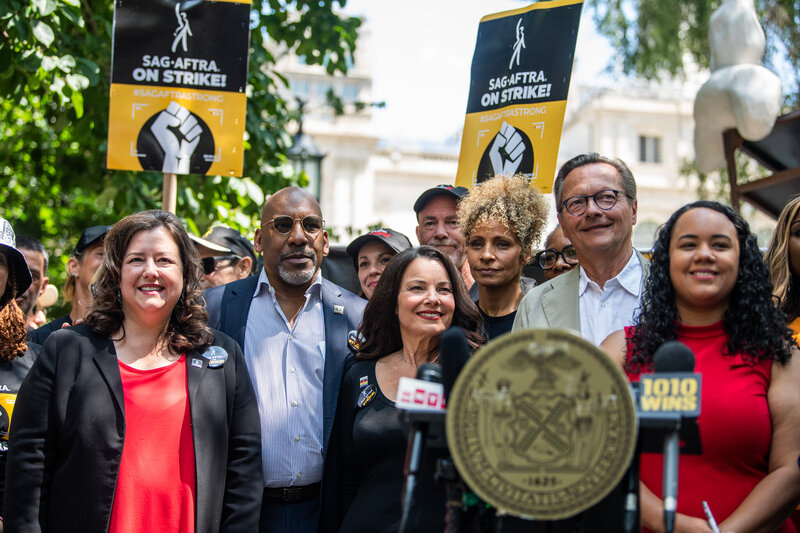The 76-member national board of the union that represents actors in film and television said on Friday that it had approved, with eighty-six percent of the vote, to submit a draft contract with studios to members for approval.
Beginning on Tuesday, the ratification procedure will run until the first week of December. However, actors may return to work right away.
The deal, which the union’s vocal president Fran Drescher valued at over $1 billion over three years, is anticipated to be approved by members. The “extraordinary scope” of the agreement was emphasized by her, who listed several benefits such as improved hair and makeup services on sets, a requirement for intimacy coordinators for sex scenes, a higher minimum wage, better financing for health care, concessions from studios on self-taped auditions, and protections regarding the use of artificial intelligence.
The preliminary deal was agreed on Wednesday between the Alliance of Motion Picture and Television Producers, which negotiations on behalf of studios, and the union, SAG-AFTRA, which represents tens of thousands of performers. It came after a sour confrontation that played a part in the entertainment industry’s almost total stoppage of output. It was the longest film and television strike in the union’s ninety-year history, lasting 118 days.
The association said, “We are also appreciative of the industry’s enthusiastic return to work.”
The entertainment industry was severely impacted by both the writers’ strike, which ended in September, and the actors’ strike, which began in May. Numerous thousands of crew members were left unemployed, and some of them lost their houses and had to rely on food banks to buy groceries. Certain small businesses that serve to studios, such prop warehouses, catering services, and costume dry cleaners, may never be able to bounce back.
The two strikes resulted in losses of almost $10 billion countrywide. The major studios employ soundstage facilities in Georgia, New York, New Jersey, and New Mexico in addition to their Los Angeles headquarters.
A synopsis of the proposed deal was released to the public on Friday by the SAG-AFTRA board, which is composed of Sharon Stone, Sean Astin, and Rosie O’Donnell. Despite not getting all it requested, the union made great progress.
The last point of contention was “synthetic fakes,” or the use of artificial intelligence to combine the distinguishable qualities of genuine performers to create a completely fake persona. Consent and compensation guarantees were gained by the union.
However, stars had no bearing on this strike. Stars like Brad Pitt and Jennifer Lawrence handle their own contract negotiations—or, more accurately, their representatives do. The draft contract specifies minimums, or the pay that inexperienced performers get.
In the first year of a contract, SAG-AFTRA had asked an increase in minimum wage of eleven percent. The studios had stipulated that they could only provide five percent, which was the same amount the writers’ and directors’ unions had just offered (and accepted). Ultimately, the union succeeded in securing a first-year rise of 7%.
SAG-AFTRA was unsuccessful in one area. It had entered into talks with the demand for a cut of the money made by streaming services. It had first suggested a 2 percent stake, but then lowered it to 1 percent and changed course to charge per subscription. Companies like Netflix objected, stating that the demand was “a bridge too far,” despite Ms. Drescher having made it a top priority.
Rather, the union decided to accept the studio alliance’s new residual—a sort of royalty—for streaming shows based on performance indicators after minor modifications. Actors in streaming series that draw at least 20% of subscribers will get a bonus, which is comparable to what the Writers Guild of America was able to accomplish in its talks.
In contrast to the Writers Guild, SAG-AFTRA managed to convince the studio alliance to implement a scheme wherein 25% of the bonus money would be allocated to a fund that will then be used to compensate performers in less popular streaming series.
“Is this a win or a loss, I wondered?” said Ms. Drescher. But the money is coming in. We launched a new source of income. The fact that we entered another pocket is what counts.











+ There are no comments
Add yours